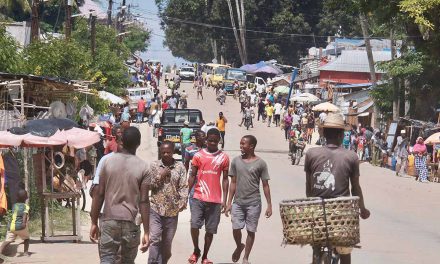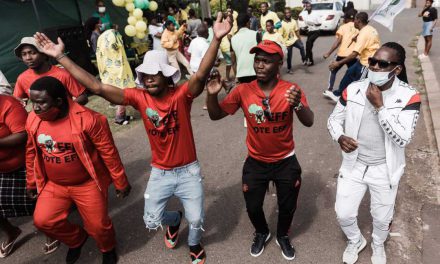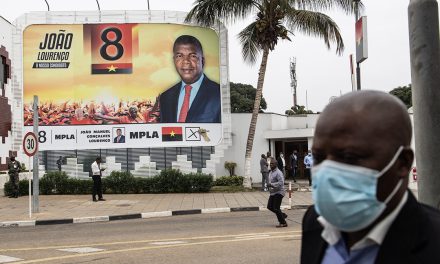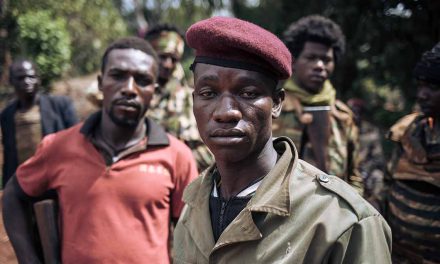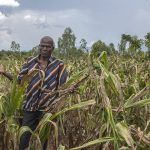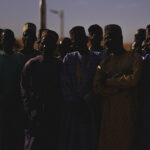According to numerous political commentators, President João Lourenço’s pursuit to be re-elected on 24 August 2022 is facing increasing pressure from the main opposition leader of UNITA, Adalberto Costa Júnior, who is ahead in several opinion polls.
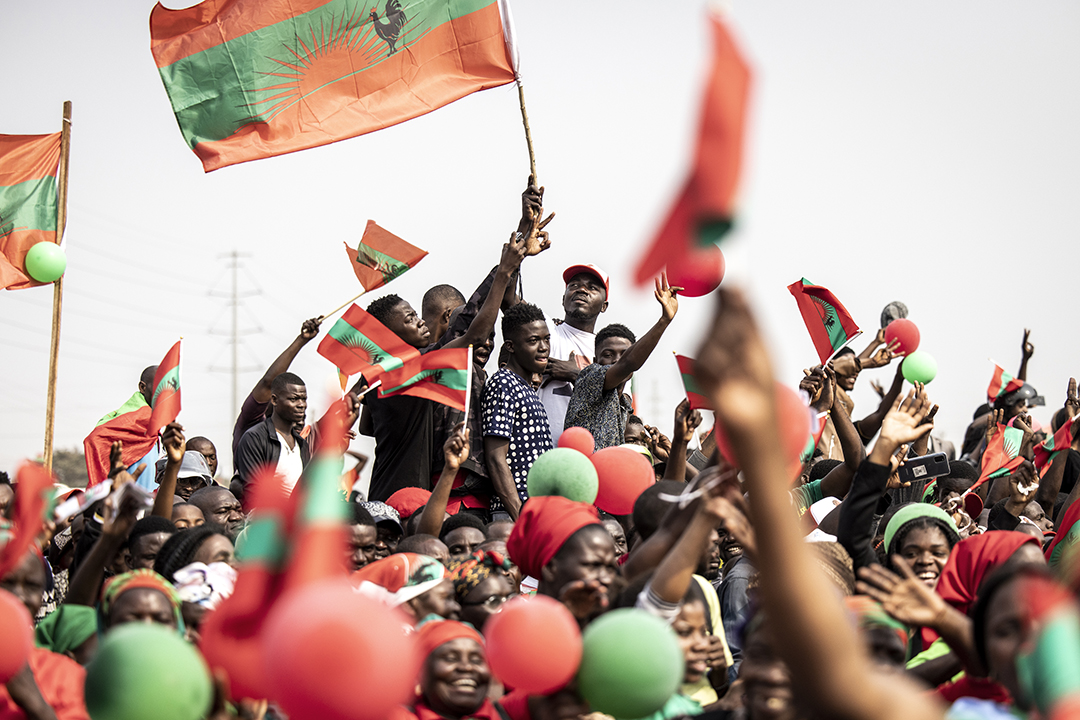
Supporters of Angolan opposition party National Union for the Total Independence of Angola (UNITA) wave party flags during the UNITA final campaign rally ahead of general elections, in Luanda. Photo by JOHN WESSELS/AFP
A poll from the Mudei Civic Movement, a citizen-based election monitoring group, in July claims that UNITA and its United Patriotic Front holds 50.2% support across the country, and the ruling MPLA trailed with only 27.9%. Also, according to a recent Afrobarometer survey, the number of Angolans expected to vote for UNITA has increased since 2019, narrowing the gap between the two main parties to just seven percentage points, while almost half of the voters are still undecided.
If these polls and surveys are to be believed, Angola will shortly be preparing for a power transition. If true, this potential transfer of power could be a rather worrying development for the several other (liberation) ruling parties in the region. Previous election results in Mozambique, Namibia, South Africa and Zimbabwe have seen all the ruling parties experience a decrease in support, with only Frelimo in Mozambique still securing a two-thirds majority.
The fact is that UNITA’s origin and legacy are still closely linked to its support for the former apartheid regime in South Africa and its regional destabilising efforts. If Costa Júnior does win the election, it is difficult to see him being warmly accepted by his contemporaries, who all at some point fought against or supported the MPLA against UNITA.
As the region prepares for several general elections to be contested by liberation parties in the next two years, will a UNITA victory cause some political discomfort as Zimbabwe prepares to go to the polls in 2023, and Botswana, Mozambique, Namibia and South Africa in 2024? Or will a UNITA victory be a catalyst for opposition parties throughout the region to contest elections?
While polls and surveys are important platforms to highlight popular political sentiment in a country, they have their limitations. Public opinion polls are not always accurate as they may reflect bias depending upon the sample polled, if the sample is too narrow, or is not accurately reflective of the population.
More importantly, respondents tend to not always answer truthfully, impacting the accuracy of the poll. With too many polls or surveys conducted, their reliability may be questioned, including that the use of some language used in conducting the polls and surveys may not elicit accurate responses.
MPLA or UNITA – who will be victorious?
To better evaluate who is in a stronger position ahead of the polls, an assessment of the two leaders follows. In Angola, a president is elected as the leader of the party who received the most votes in the National Assembly, which reflects who the citizens want as their leader.
First, an examination of Costa Júnior’s and UNITA’s position leading up to election day:
- Costa Júnior has been able to position himself as a viable option for first-time urban youth voters who have not lived through the civil war and are not tied to legacy politics but rather are concerned about issues such as poverty, unemployment and the lack of economic prospects.
- His election as the leader of UNITA in 2019 by a landslide is important as it has allowed the growth of the party’s support base beyond its traditional strongholds.
- The UNITA-led formation of the informal United Patriotic Front coalition may prove significant as it includes candidates from outside of the party on its electoral list. Other coalition members include two influential opposition leaders — Abel Chivukuvuku, a former senior UNITA member, founder of Convergência Ampla de Salvação de Angola – Coligação Eleitoral and leader of Partido para o Renascimento Angolano – Juntos por Angola. The other is Justino Pinto de Andrade from the Democratic Bloc Party. Some MPLA dissidents and civil society members have also joined the coalition.
- The United Patriotic Front-backed political protests have increased as election day draws nearer. As is common in most election years across all countries, election-focused political protests do increase. As with some polling and survey limitations, the media may focus more on the protests closer to the election date, which may distort the opinion regarding opposition support.
- UNITA is hoping to capitalise on the anger of frustrated citizens and the increased pressure on the ruling party.
- Preliminary polls show Costa Júnior is gaining momentum in urban areas such as Luanda. This is significant as substantial numbers of voters voting for UNITA in the city previously would have been inconceivable.
Second, an examination of Lourenço’s and the MPLA’s position leading up to election day:
- Lourenço has to some degree been able to separate his administration from that of former president José Eduardo dos Santos. This has aided his campaign as he has been credited as a corruption-buster, endearing him to the voting public.
- International partners and organisations such as the World Bank, International Monetary Fund and the International Finance Corporation have been welcomed back into the country. This is indicative of their confidence in Lourenço and bodes well as Angolans are looking for better economic prospects for all.
- The MPLA’s incumbency and long rule will make it difficult for an inexperienced UNITA, which has never been in power, to unseat a party that remains greatly invested in the state and its machinery.
- As various political commentators have commented on UNITA’s increasing popularity, the governing party remains highly influential over state institutions such as the National Electoral Commission (NEC) and the constitutional court, which may benefit them at a later stage if electoral disputes arise.
- Continued confusion regarding claims that millions of deceased citizens are still included on the electoral lists. Angolans living abroad will be eligible to vote and NEC data collected estimate an additional five-million voters this election cycle. This confusion may lead to voting irregularities, which may benefit the incumbent.
- The composition of the NEC is largely made up of government and MPLA appointees. As the incumbent party, during its campaigning period, state media offered disproportionate coverage to MPLA events and government projects associated with the MPLA.
- While it may be difficult to measure, the MPLA’s election-winning pedigree cannot be underestimated. From experience, the MPLA has been able to put aside all party differences and win all elections held since independence.
In short, while Costa Júnior and UNITA may be better positioned to contest these upcoming elections than at any other time in Angola’s electoral history, it will be difficult for them to win. Political commentators may have become carried away by the narrative of MPLA’s downfall and UNITA’s strong position and increased popularity.
A more sober analysis will conclude that a poor performance for the MPLA is relative; it is not necessarily equivalent with a loss at the polls.
For this reason and the discussion above, it does not appear that Lourenço will lose and the MPLA will remain the ruling party. While UNITA has made inroads, it may not yet be ready to defeat the long-ruling incumbent MPLA at the polls on 24 August 2022.
The election results are not expected to be known until next week.
This article was originally published in the Mail and Guardian on 24 August 2022
Craig Moffat, PhD is the Head of Programme: Governance Delivery and Impact for Good Governance Africa. He has more than 17 years of practical experience working for government institutions and multilateral organisations. He was previously employed by the South African Foreign Service, where he worked extensively at identifying and analysing security threats towards South Africa as well as the southern Africa region. Previously, he was the political advisor for the Pretoria Regional Delegation of the International Committee of the Red Cross. He holds a PhD in Political Science from Stellenbosch University.



